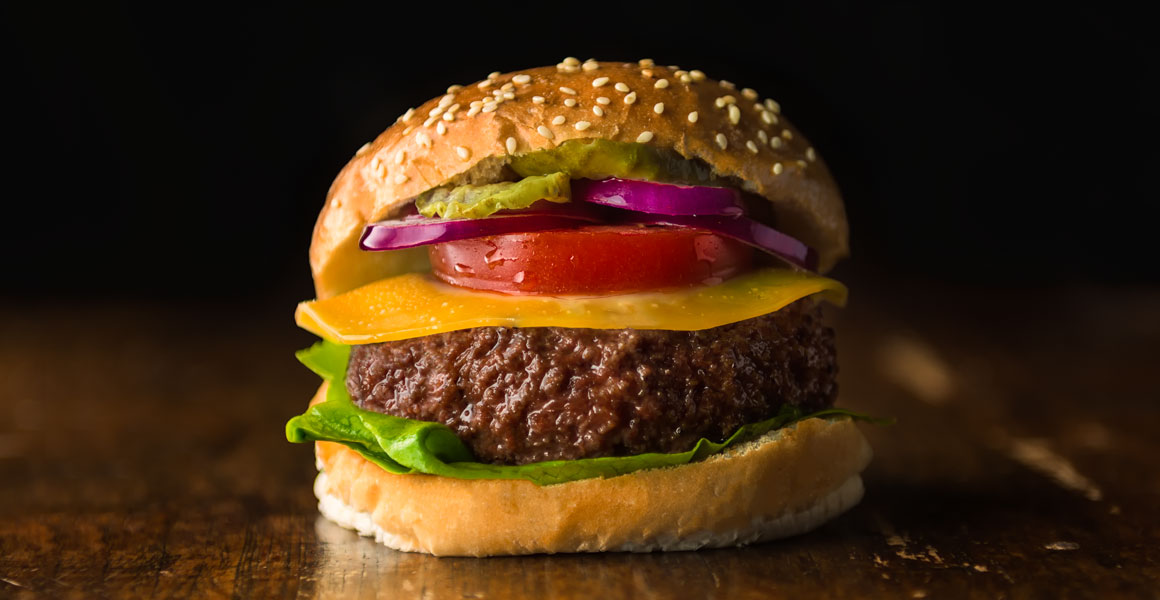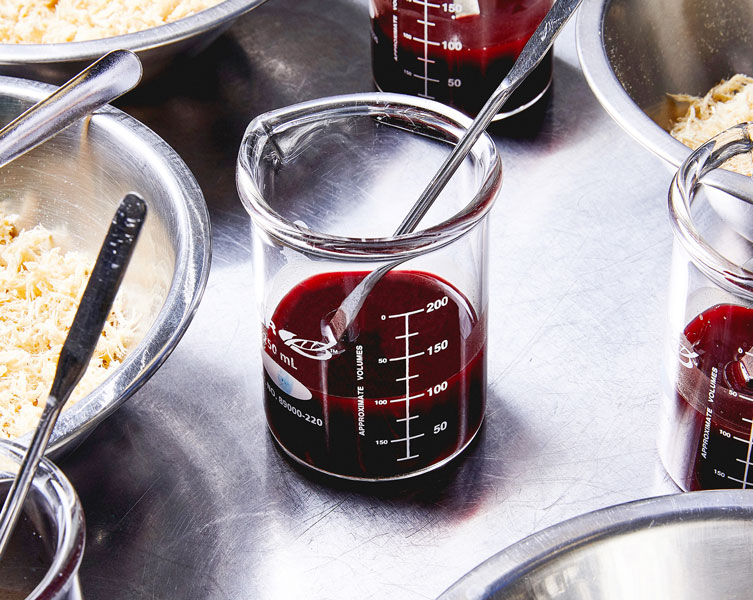Lab-grown meat could be on supermarket shelves within a decade. Would you eat a steak grown by scientists?

A lab-grown meat burger. Cell-cultured meat is the preferred term for lab-grown meat by the meat industry as as it is descriptive, yet factual and neutral. © Mosa Meat.
Meat consumption across the world has been rising since the 1960sopens in a new window. Some countries, like the United States, Argentina and Australia, eat far more meat than others - but as a rule, humanity's taste for animal protein continues to growopens in a new window.
We know that agriculture is one of the biggest threats to nature. Over 70% of wild areas have been altered, mostly to make space for farm animals and crops. Humans and cows now account for more than 96% of all mammals on Earthopens in a new window.
Commercial farming has contributed to climate change, caused widespread deforestation, impacted biodiversity and polluted waterways.
It's clear that we need to change our relationship with meat. So what's the answer?
What is plant-based meat?
Cue alternative meat. Plant-based meat has already hit mainstream markets with all sorts of foods masquerading as animal protein.
Alternative meat products made from tofu and jackfruit have been around for decades. They are a popular choice as they are high in protein and calcium and can offer a firm and chewy quality similar to meat.
Newer, more sophisticated products have also taken the meat market by storm in recent years.

One key ingredient used in plant-based meat is heme, a naturally occurring protein which provides a meaty flavour © Impossible Foods
Impossible Foods is one company hoping to change the way we eat. Founded in 2011 in California, Impossible products reproduce a meaty flavour using plants.
Their signature burger is made with textured soy protein, potato protein, coconut oil and sunflower oil. The magic ingredient is heme, which is a molecule found in high concentrations in animal meat. It makes meat look, cook and taste unmistakably meaty.
Chris Davis, a researcher at Impossible Foodsopens in a new window says, 'We cannot afford to continue using the same technology we have been using to feed eight billion people. We must use science to create new food which is at least equivalent in quality, without destroying the world and web of life.'
While plant-based meat is already a firm favourite on supermarket shelves, other companies are hoping an alternative technology could capture public imagination: lab-grown or cell-cultured meat.
What is lab-grown meat and how is it made?
Lab-grown meat is properly known as cell-cultured meat because the scientific process by which the meat is made is cell culture or tissue culture.
Fat or muscle stem cells are taken from either a live, healthy animal via a painless biopsy, or one which is already in the meat processing system. For poultry species, cells can be taken from eggs.
The cell is placed in a large stainless-steel tank called a cultivator where it is fed nutrients until it divides and grows. The cell is also given growth factor components, which are signals that tell it what to do.
The process takes two to three weeksopens in a new window depending on the type of meat being produced. In the end, the cells grow into a whole meat piece and is shaped into burgers, nuggets or chicken strips.
Memphis Meats, another California start-up, wants to bring lab-grown meat to the mainstream.
Vice President Steve Myrick says, 'We need a collaborative effort from major food industries so we can achieve food security across the world, including every region and income level.'

Cardiologist Uma Valeti, stem cell biologist Nicholas Genovese and tissue engineer William Clem founded Memphis Meats in 2015. The San Francisco based company has received investment from Richard Branson and Bill Gates. © Memphis Meats.
The benefits of alternative meats
Alternative meats are one answer to our appetite for protein. Both technologies offers a 'real' meat taste without many of the issues that come with farming, including animal cruelty.
'We stabilise the cells so we can continue to use them indefinitely,' explains Steve. 'The cells we're using now were originally procured three to four years ago. We're aiming to go completely animal-free in future.'
Both approaches also avoid risks that come with conventional farming, which is often responsible for viruses that transfer from animals to humans. Meat markets are thought to be the source of COVID-19, the pandemic that stopped the world in 2020.
Likewise, scientists can be clearer about what's going into both plant-based and lab-grown meat and are in complete control of the nutrition profile. For instance, they can adjust the ratio of good and bad cholesterol and fatty acids in a product.
'We've found there are a lot of ways of fine-tuning the end product based on what we do at that stage, like the feed we give the cells and some of the decisions and production processes we go through,' says Steve. 'We can really adjust the taste, texture, aroma and in some cases, nutrition profile.'
Another big advantage of alternative meat is nothing goes to waste. In a cell-culturing process, scientists only produce what is needed, and leave out brain, bones and skin. And in a vegan burger, no animal parts are needed at all.
'With cell-cultured meat, we only need to produce the product that ultimately goes to the consumer,' says Steve.
Both lab-grown and plant-based meats have big sustainabilty claims.
'Humans only receive about 3% of the raw materials that goes into a cow,' adds Chris at Impossible Foods. 'Farmers work really hard to generate corn and soy and by funnelling it through cows, 97% of that usually ends up in water or atmosphere as greenhouse gases.
'Can you imagine any other commodity industry on the planet like oil or mining, throwing away 97% of their raw materials?'
And while there is some unavoidable waste in terms of energy and water when producing lab-grown meat, it is significantly less than conventional farming.

Cell-cultured chicken being sliced © Memphis Meats
So is lab-grown and plant-based meat the answer?
Plant-based burgers, nuggets and sausages have exploded in popularity. Now a mainstream success, many giant fast-food franchises and retailers such as Burger King and Sainsburys sell their own version of the product.
However, lab-grown meat is yet to be available commercially, with large costs, small scale productions and food regulations slowing things down. There are about 50 different companies working on it, and it could become available to public consumers within a decade.
'We have publicly unveiled several species including beef, chicken and duck,' says Steve. 'We've worked to build technology that is multispecies and animal agnostic from the start and have high confidence we can make them interchangeable.
'We've also done considerable work on pork and seafood although these are yet to be shared officially.'
Health credentials
A spokesperson for British Nutrition Foundation (BNF)opens in a new window, a British charity that provides impartial, factual information on food and nutrition, says, 'It is too early to tell whether lab-grown meat could have any negative effects.
'There isn't any information on the nutritional profile of such food, although it may be possible to manipulate it so it has the same nutritional value as conventional meat.
'This depends on what is achievable when making lab-grown meat on an industrial scale, and what consumers want from these products.'

Cell-cultured duck © Memphis Meats
Chris says, 'Right now, our plant-based meat matches conventional meat. In future, our products will be healthier and more nutritious than the animal product as we control every ingredient that goes into it.
'We will also probably have to make a plant-based meat for everything to really tackle conventional agriculture - from swordfish sashimi to quail eggs.'
We know more about how good plant-based meat can be for the body.
BNF says, 'For plant-based meat alternatives, the recommendations would be to choose options that are lower in saturated fat and salt.
'Foods based on vegetables and pulses tend to be lower in saturates and calories and higher in fibre than a meat-based product, but replicating the taste and texture of means you need to add a certain amount of fat and salt to get a similar profile, so these products could be less healthy options.'
The future
It is unlikely real meat will be completely eliminated any time soon. Some parts of the world rely on it, and the future of meat production will most likely be a combination of all three methods.
Steve says, 'I anticipate Memphis Meats products going mainstream in the next 10 to 20 years but also being a part of the human diet alongside conventional meat, plant-based meat alternatives, and a number of other protein sources. We need all the tools in our toolkit to feed humanity.'
Chris says, 'In 50 years from now, the science driven food - whatever that ends up looking like - will taste better and be cheaper than the animal derived food.
'We're starting to move in the right direction, but the question is, are we moving fast enough? Can we stop people eating meat fast enough to save the rainforest?'

Fixing Our Broken Planet
Discover science-backed, hopeful solutions that will help us to create a more sustainable world.
New gallery open now.

Do your bit for nature
Biodiversity is connected to almost every aspect of our lives, but it needs our help. Small actions can make a big difference.




Don't miss a thing
Receive email updates about our news, science, exhibitions, events, products, services and fundraising activities. We may occasionally include third-party content from our corporate partners and other museums. We will not share your personal details with these third parties. You must be over the age of 13. Privacy notice.
Follow us on social media